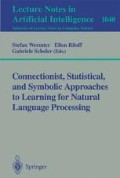Abstract
This paper presents results on using a new inductive logic programming method called Foidl to learn the past tense of English verbs. The past tense task has been widely studied in the context of the symbolic/connectionist debate. Previous papers have presented results using various neural-network and decision-tree learning methods. We have developed a technique for learning a special type of Prolog program called a first-order decision list, defined as an ordered list of clauses each ending in a cut. Foidl is based on Foil [19] but employs intensional background knowledge and avoids the need for explicit negative examples. It is particularly useful for problems that involve rules with specific exceptions, such as the past-tense task. We present results showing that Foidl learns a more accurate past-tense generator from significantly fewer examples than all previous methods.
Preview
Unable to display preview. Download preview PDF.
References
F. Bergadano and D. Gunetti. An interactive system to learn functional logic programs. In Proceedings of the Thirteenth International Joint Conference on Artificial Intelligence, pages 1044–1049, Chambery, France, 1993.
F. Bergadano, D. Gunetti, and U. Trinchero. The difficulties of learning logic programs with cut. Journal of Artificial Intelligence Research, 1:91–107, 1993.
M. E. Califf. Learning the past tense of English verbs: An inductive logic programming approach. Unpublished project report, 1994.
R. Mike Cameron-Jones and J. Ross Quinlan. Efficient top-down induction of logic programs. SIGART Bulletin, 5(1):33–42, Jan 1994.
P. Clark and T. Niblett. The CN2 induction algorithm. Machine Learning, 3:261–284, 1989.
W.W. Cohen. Compiling prior knowledge into an explicit bias. In Proceedings of the Ninth International Conference on Machine Learning, pages 102–110, Aberdeen, Scotland, July 1992.
L. De Raedt and M. Bruynooghe. A theory of clausal discovery. In Proceedings of the Thirteenth International Joint Conference on Artificial Intelligence, pages 1058–1063, Chambery, France, 1993.
N. Lavrac and S. Dzeroski, editors. Inductive Logic Programming: Techniques and Applications. Ellis Horwood, 1994.
C. X. Ling. Learning the past tense of English verbs: The symbolic pattern associator vs. connectionist models. Journal of Artificial Intelligence Research, 1:209–229, 1994.
C. X. Ling, 1995. Personal communication.
C. X. Ling and M. Marinov. Answering the connectionist challenge: A symbolic model of learning the past tense of English verbs. Cognition, 49(3):235–290, 1993.
B. MacWhinney and J. Leinbach. Implementations are not conceptualizations: Revising the verb model. Cognition, 40:291–296, 1991.
R. J. Mooney and M. E. Califf. Induction of first-order decision lists: Results on learning the past tense of English verbs. Journal of Artificial Intelligence Research, 3:1–24, 1995.
S. Muggleton and C. Feng. Efficient induction of logic programs. In Proceedings of the First Conference on Algorithmic Learning Theory, Tokyo, Japan, 1990. Ohmsha.
S. H. Muggleton, editor. Inductive Logic Programming. Academic Press, New York, NY, 1992.
M. Pazzani and D. Kibler. The utility of background knowledge in inductive learning. Machine Learning, 9:57–94, 1992.
J. R. Quinlan. Past tenses of verbs and first-order learning. In C. Zhang, J. Debenham, and D. Lukose, editors, Proceedings of the Seventh Australian Joint Conference on Artificial Intelligence, pages 13–20, Singapore, 1994. World Scientific.
J. R. Quinlan and R. M. Cameron-Jones. FOIL: A midterm report. In Proceedings of the European Conference on Machine Learning, pages 3–20, Vienna, 1993.
J.R. Quinlan. Learning logical definitions from relations. Machine Learning, 5(3):239–266, 1990.
B. L. Richards and R. J. Mooney. Automated refinement of first-order Horn-clause domain theories. Machine Learning, 19(2):95–131, 1995.
R. L. Rivest. Learning decision lists. Machine Learning, 2(3):229–246, 1987.
D. E. Rumelhart and J. McClelland. On learning the past tense of English verbs. In D. E. Rumelhart and J. L. McClelland, editors, Parallel Distributed Processing, Vol. II, pages 216–271. MIT Press, Cambridge, MA, 1986.
G. I. Webb and N. Brkic. Learning decision lists by prepending inferred rules. In Proceedings of the Australian Workshop on Machine Learning and Hybrid Systems, pages 6–10, Melbourne, Australia, 1993.
David Yarowsky. Decision lists for lexical ambiguity resolution: Application to accent restoration in Spanish and French. In Proceedings of the 32nd Annual Meeting of the Association for Computational Linguistics, pages 88–95, Las Graces, NM, 1994.
J. M. Zelle and R. J. Mooney. Combining top-down and bottom-up methods in inductive logic programming. In Proceedings of the Eleventh International Conference on Machine Learning, pages 343–351, New Brunswick, NJ, July 1994.
Author information
Authors and Affiliations
Editor information
Rights and permissions
Copyright information
© 1996 Springer-Verlag Berlin Heidelberg
About this paper
Cite this paper
Mooney, R.J., Califf, M.E. (1996). Learning the past tense of English verbs using inductive logic programming. In: Wermter, S., Riloff, E., Scheler, G. (eds) Connectionist, Statistical and Symbolic Approaches to Learning for Natural Language Processing. IJCAI 1995. Lecture Notes in Computer Science, vol 1040. Springer, Berlin, Heidelberg. https://doi.org/10.1007/3-540-60925-3_60
Download citation
DOI: https://doi.org/10.1007/3-540-60925-3_60
Published:
Publisher Name: Springer, Berlin, Heidelberg
Print ISBN: 978-3-540-60925-4
Online ISBN: 978-3-540-49738-7
eBook Packages: Springer Book Archive

